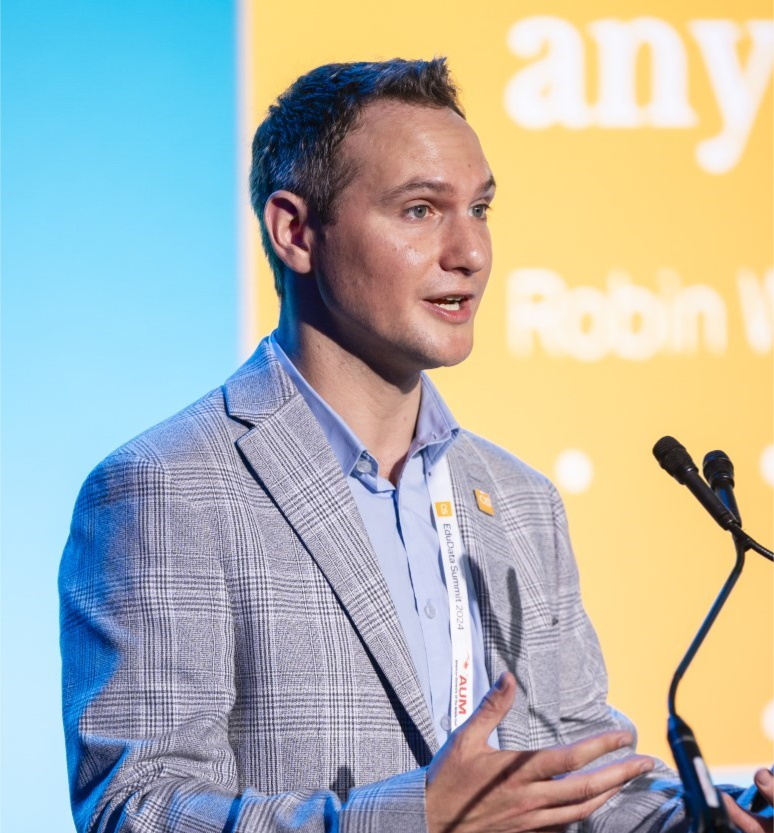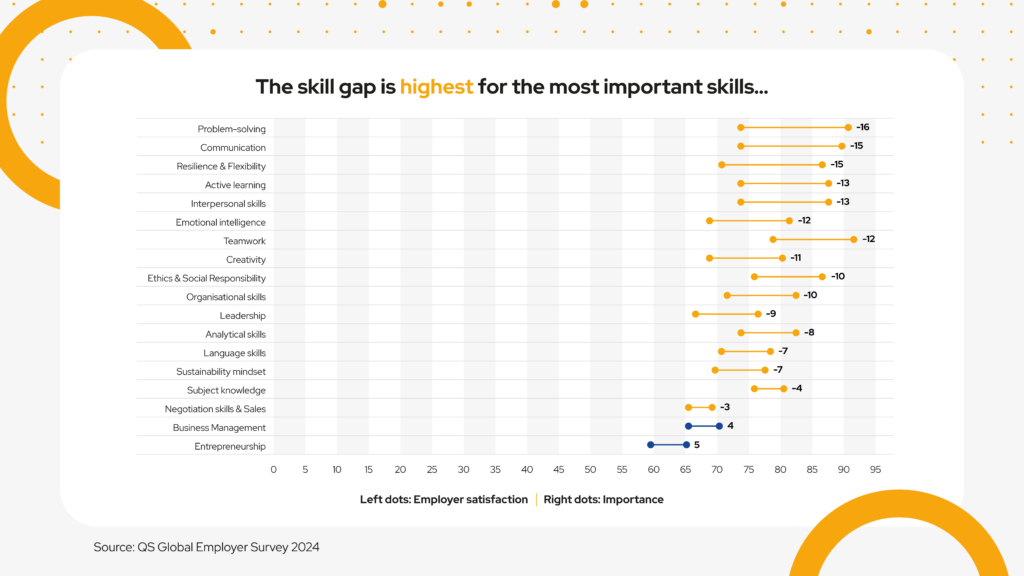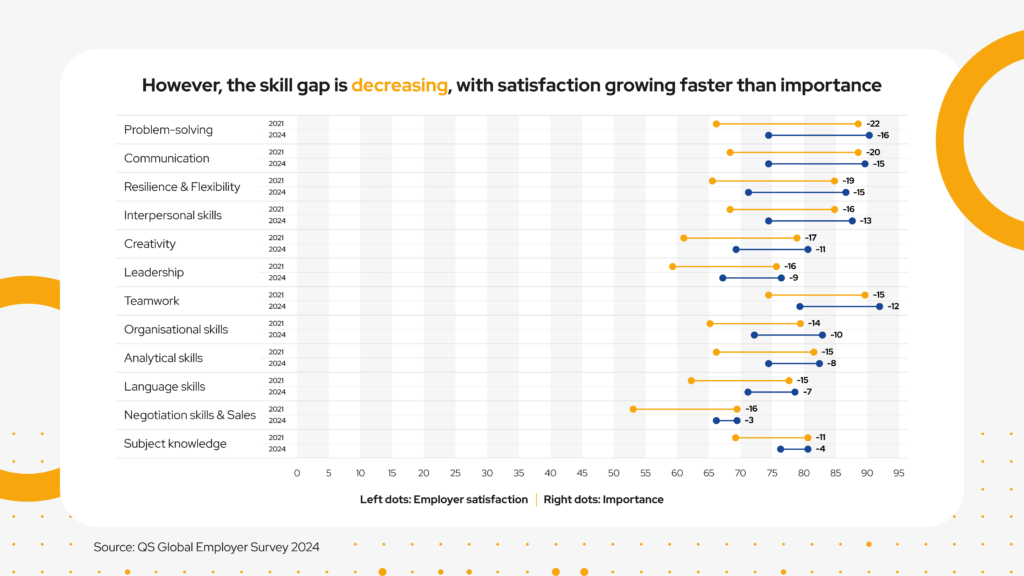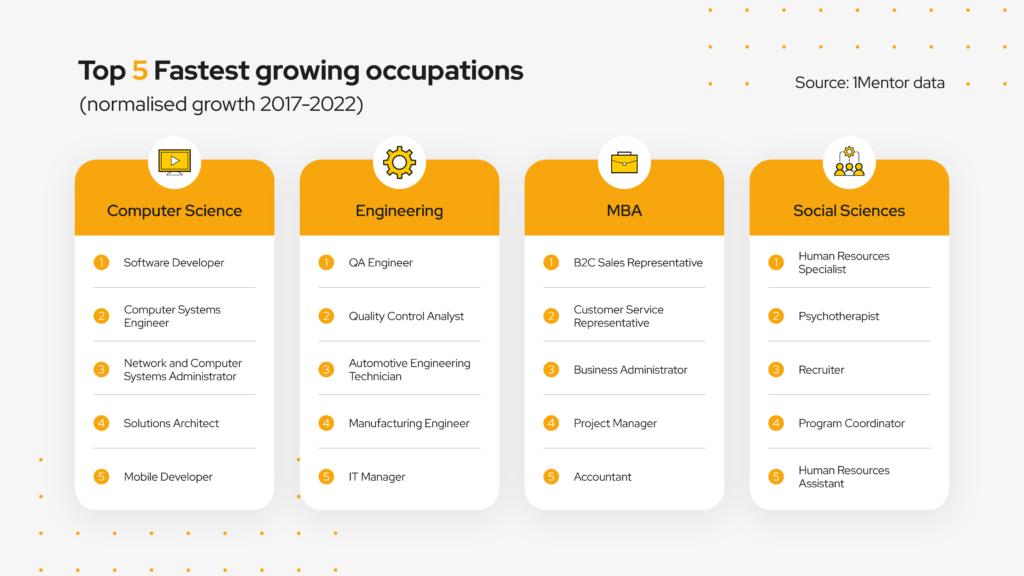
At QS EduData Summit 2024, we brought together experts in the fields of AI, education, employment, and ethics to explore, among plenty of other important topics, the vital collaboration between universities and employers to address the skills gap.
One data-led session, titled ‘Quantifying the Skills Gap’ discussed strategies for aligning education with industry needs, providing practical experience, and upskilling the workforce. Powered by QS data, QS Insights Manager, Alex Berka and QS Senior Insights Specialist, Chris Strods explored what universities have to do to create job-ready graduates.
Matching expectations with reality
“The expectations from graduates have never been higher, in terms of what they want from university education.” said Alex, kicking off the session.
“At the same time, the preferred skills employers want from their graduates are rapidly changing. The expectation of graduate performance is also rapidly shifting.

“Throughout all of this, universities have never been more important, especially when it comes to bridging the skills gap, and managing the expectations of employers while also ensuring that overlaps very strongly with graduate performance on those emerging skills.”
Back to basics: What are skills?
Alex explained the two components of what really defines a skill. To him skills are:
- An ability gained through experience: “In higher education, it’s for students to learn those experiences through their studies.”
- A promise made by universities to students: “There is very much an unspoken agreement that universities will be able to guide students to help them understand what those skills are, adding value to employers.”
The 21st century skills gap
According to McKinsey & Company, universities are seeing an emerging importance of new skills: ‘adaptability’, digital proficiency’ and ‘cross-functional collaboration’. 87% of companies expect to experience or already have a skills gap.
This means that graduates need to be much more attuned to global market dynamic shifts and employer needs.
Alex added, “Crucially, they need to know from the outset, how they can articulate how the skills they’ve gained during their time at university can help to add value to those employers as well.”
Additionally, Boston Consulting Group (BCG) estimated that 90% of the global workforce will require upskilling/reskilling by 2030, highlighting that universities must lead the way in bridging these gaps.
“All of the research we’ve seen from other parties’ points towards a rapid development and shift in how we all attain skills”.
Top skills versus satisfaction levels

In the QS Global Employer Survey 2024, we asked employers about the most important skills they seek in graduates and their satisfaction levels with those skills. Employer satisfaction is indicated by the dots on the left, while importance is shown in the dots on the right. As it shows, the largest gaps were found in ‘problem-solving’, ‘communication’, and ‘resilience and flexibility’.
Chris Strods noted: “Business management’ and ‘Entrepreneurship’ are the only skills in which satisfaction is greater than importance, in which there is a negative gap. They also happen to be among the least important skills valued by graduate employers.”

Upon reviewing the 2021 data, the order of skills gaps remains similar, but the gaps are shrinking across all listed skills.
Chris continued: “It’s a perfect comparison because the world was a very different place in early 2021 and a year of COVID-19 influencing graduate skill development. However, it does show that we are trending in the right direction. But we are looking at aggregates here, and sometimes aggregates can serve to obfuscate and hide some of the real underlying trends.”
Empowering future careers
In the QS International Student Survey 2024, 58% of prospective international students cite the ability to learn new skills among their most important career considerations when choosing a university.
“Again, I think that really reiterates the role which universities play in educating their students on the right skills they need, while also helping them articulate that for themselves so that they have a better understanding of how they add value to potential employers”, Alex said.
Rocketing to success
1Mentor, acquired by QS in January 2024, leverages AI to analyse data from over 170 million job listings to identify industry-demanded skills and existing skills gaps.
According to 1Mentor data, the top five fastest growing occupations are:

During the session, Alex highlighted the value of this information for universities:
“You can really start to see how we’re bringing in these different data sources to drive our narrative in how we can help universities. It’s all well for us looking at different skills gaps and the importance and relative satisfaction of different skills, but we really want to make sure that all of this is applicable to the job market of tomorrow.
“What I think is interesting is that we’re only showing a snapshot of a few different subject areas here, but you can see the variation. That reiterates the role for universities to be able to provide very tailored support towards students and very specific and unique points along their study cycle.”
Use QS 1Mentor to bridge skills gaps unknown to both students and career advisors
Kemi Jona, Vice Provost for Online Education and Digital Innovation at the University of Virginia explores the importance of platforms like QS 1Mentor in bridging the skills gaps



